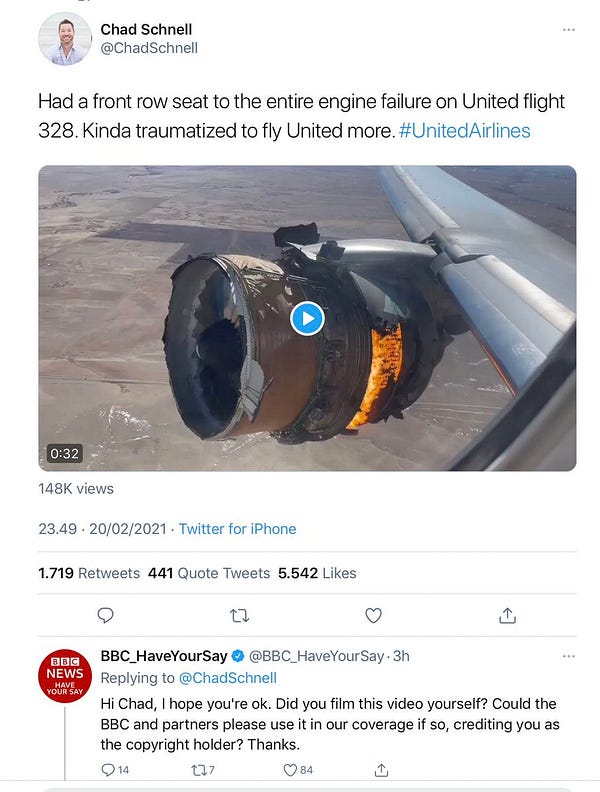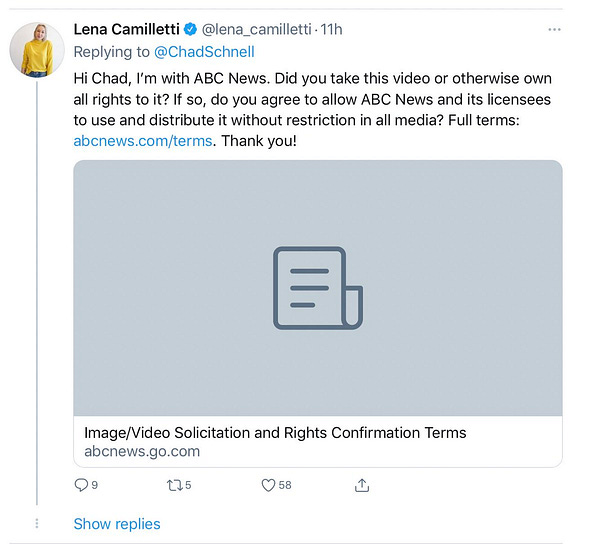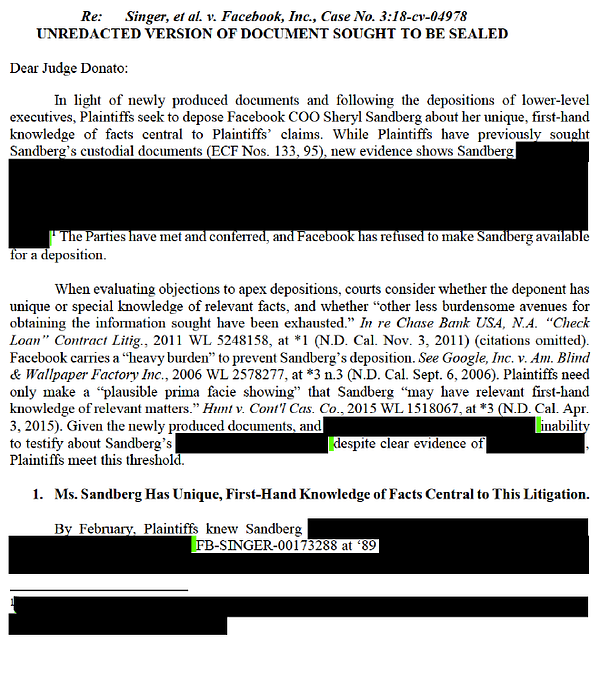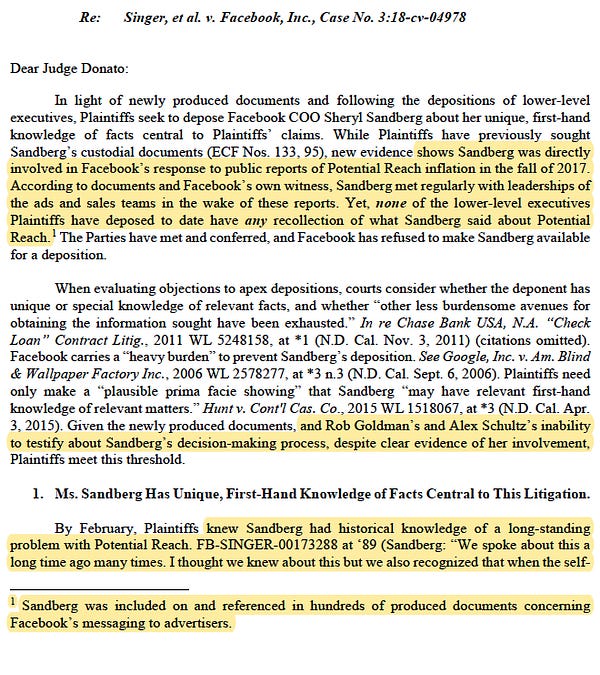Over the weekend, passengers on a plane flying from Denver to Honolulu watched in horror as an engine erupted, raining debris across lawns and fields in Broomfield, Colorado, a Denver suburb, forcing the plane to make an emergency landing back in Denver.
And because we live in a connected world, we all got to watch the engine go up in flames, courtesy of Chad Schnell.


But we also get to see one aspect of modern journalism kick in to gear: the reply from reporters asking to use the video. Anyone who’s ever taken a photo or video that is deemed newsworthy, knows the drill.
Last February, for instance, I, along with a couple thousand of my closest commuter friends, was stuck in the 10th ring of hell, Penn Station. So, doing what any digitally aware person does, I took a video and posted to Twitter:


(Also, looking at the date, February 3, I shudder thinking about how unplanned events like this at that time could have been Coronavirus super-spreader events.)
And as soon as I posted, the replies came. From CBS, ABC, NY1, all asking for permission to use the video, with credit, of course.
So why bring up this pretty mundane, if not routine journalistic practice?
As Danish media analyst Thomas Baekdal notes, news organizations send out reporters to ask for permission for content instead of paying for it. It’s quite rich, he argues, that publishers are “screaming that Facebook should [pay] for links.”




This thread is also important, as it shows how citation is a tricky game, one that publishers play fast and loose with. His argument, that publishers take content from the web all the time without paying for it, juxtaposed with what’s happening in Australia is a curious snapshot of digital media today.
Last week, Facebook blocked Australia from sharing news links as a response to a law, as Matt Stoller writes, that is:
designed to target a specific problem, which is the death of newspapers resulting from the monopolization of the Australian advertising market. Australia has lost 15% of its newspapers since 2008, and dozens of small cities now have no newspaper coverage. This graph from the ACCC digital platform inquiry shows part of the monopoly problem driving the collapse.
What Does This Australian Law Do?
The law says that if you are a dominant digital platform, then you have an obligation to engage in good faith bargaining with news outlets whose content you distribute over the terms of that distribution. The law only applies if there is a bargaining imbalance with media outlets. So this isn’t a tax, it is an anti-monopoly law.
Much of the bill has to do with designating who gets to be a news publisher. The bill says pure opinion stuff doesn't count, and neither does pure sports and entertainment. Media outlets have to register with the government to get bargaining rights. The bill mandates that digital platforms tell media outlets in advance what data they collect and when they are going to change important algorithms on which those outlets rely, like if they are going to change referral traffic in a way that would eliminate more than 20% of the audience and revenue. That’s totally reasonable, basically saying Facebook has to give you two weeks notice if it is going to destroy your business.
Highly recommend reading his post,as well as this thread from Cory Doctorow, which highlights why this even exists in the first place;
Remember, one of the problems this system is supposed to resolve is powerful entities (Googbook) using their power to punish news organizations for complaining about their behavior – governments were in that game long before Googbook came into existence.
And there's another problem: the structure of the Australian news market, which is yet another highly concentrated industry, dominated by a rapacious billionaire who uses his power to manipulate politics: Rupert Murdoch.
Murdoch conquered Australian media the same way Googbook conquered the net: through anticompetitive conduct that was waved through by collusive regulators who never met a monopoly they didn't view as efficient.
It's not wrong to say that the only reason this regulation got off the drawing-board is that Murdoch viewed it as a way to shift a few balance-points from Big Tech's side of the ledger to Big Media's side.
Over at TechDirt, Mike Masnick argues the opposite, that this is indeed a link tax, and is just one of two major problems with Australia’s law:
First is the link tax. This is fundamentally against the principles of an open internet. The government saying that you can't link to a news site unless you pay a tax should be seen as inherently problematic for a long list of reasons. At a most basic level, it's demanding payment for traffic. There are two entire industries out there based entirely around trying to get more traffic from these companies: "search engine optimization" and "social media management."
The reasons there are those industries is because everyone else in the world has figured out that having prominent links on search engines and social media is valuable in its own right and that it's up to the sites that get those links, and the corresponding traffic, to make use of it.
But here, a bunch of lazy newspaper execs who failed to adapt and to figure out better internet business models not only want the traffic, they also want to get paid for it.
This is like saying that not only should NBC have to run an advertisement for Techdirt, but it should have to pay me for it. If that seems totally nonsensical, that's because it is. The link tax makes no sense.
Masnick also argues that perhaps the bigger problem of the law is that it required Google and Facebook to give a heads up to publishers when they change their algorithms. This is, he writes, “disconnected from reality.”
Having to tell newspapers (and them alone) about those changes with a few weeks notice is basically giving those news organizations the keys to the kingdom: it's telling them how to game the algorithms. If you think bogus clickbait is a problem now, just imagine what it's like when all of the Australian press get to know the secrets behind the algorithm, and get to prepare for any changes.
The whole story is absolutely ridiculous. And the most incredible thing is that no matter what Facebook did here it would have gotten yelled at. And the proof is not hard to find. Because just an hour or two before Facebook made this announcement, Google went the other way -- coming to an agreement to pay Rupert Murdoch for featuring Murdoch-owned news organizations content on Google. And people freaked out, complaining about Google helping fund Rupert Murdoch's disinformation empire. Except... that's the whole point of the law? So it's a bit bizarre that the same people are mad about both Facebook's decision to not give free money to Rupert and Google caving to do exactly that.

The economics of digital media today start and end with Facebook and Google. And over the last week, we’ve learned that once again Facebook lied to advertisers about metrics; that it allegedly knew its ad metrics were inflated and misleading, and ignored to fix the problems. This seems to happen quite a bit with Facebook.
And court documents were also unsealed last week showing that Facebook COO Sheryl Sandberg allegedly directly oversaw the cover up.



(And for yet another damning piece against Facebook, read this BuzzFeed News story from last night about how Zuckerberg’s moving the content moderation goalpoasts for Alex Jones in 2012 had an effect on the spread of misinformation over the last couple of years.)
The one thing that is absolutely clear in all of this: readers lose. But that much has been clear for the last two decades, as digital has become a backwater for media, allowing tech companies to bend media systems to their will.
Now, however, because we can’t walk and chew gum at the same time, we are forced to decide between rooting for Murdoch or rooting for Facebook/Google. No matter which billionaire wins in the end, we, the people, lose.
Thank you for allowing me in your inbox, today and every day. If you have tips, or thoughts on the newsletter, drop me a line. Or you can follow me on Twitter. If you arrived here via social or a colleague’s referral, please consider signing up. Thanks for reading, and I’ll see you tomorrow!
The Beatles, “Money (That’s What I Want)
Some interesting links:
For VC injections into media:
Pocket Outdoor Media raises $150 million from Sequoia Heritage (Axios)
For breaches:
Clubhouse Chats Are Breached, Raising Concerns Over Security (Bloomberg)
For a look at Russian journalism:
How Investigative Journalism Flourished in Hostile Russia (NYT)
For a future of media:
Defector.com’s journalistic experiment began with a staff walkout. It might actually be working. (WaPo)
Congressional Committee Presses Cable Providers on Election Fraud Claims (NYT)
L.A. Times owner exploring sale of company (WSJ)
For buyers:
MRC Issues OTT, CTV, SSAI Draft: Will Be Considered For Future Accreditation (MediaPost)





As a very long-time freelance journalist and author, one of my favorite clips (posted by the late Harlan Ellison's account):
https://www.youtube.com/watch?v=PuLr9HG2ASs